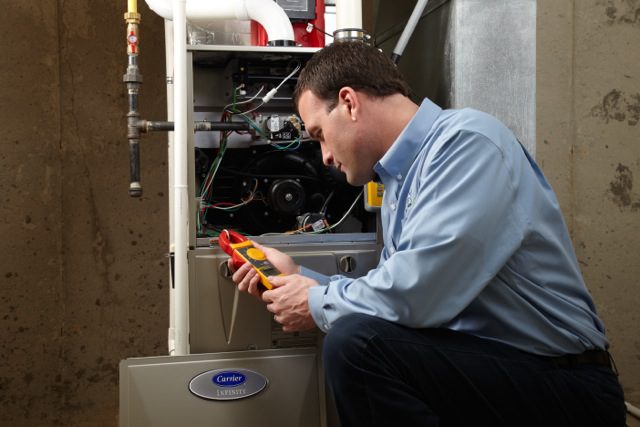First-time homeowners and warm-climate natives who recently relocated to Massachusetts—start thinking about winter before all the leaves are off the trees.
Winter may seem like a no-brainer, but if you don’t take time now to formulate a plan of action, you may find yourself unprepared or at risk when the first big snow storm hits.
Ongoing preparation
Every property owner should set aside money for home maintenance and repairs. The experts at HGTV recommend saving up to 3% of your home’s purchase price every year.
With this savings goal in mind, break the number down into bite-sized chunks you can deposit into a separate savings or checking account on a weekly basis, according to the Credit Counseling Society.
Then, it’s easy to find ways to save a few dollars each week. The money-saving strategies suggested by the Credit Counseling Society with the highest value of savings include:
- Carry water in a thermos instead of buying bottles ($2/bottle x 5 days) +$10
- Bring lunch from home up to 3 days a week +20
- Go out to eat less often each week +25
Based on the 2019 median price of a single-family home in Massachusetts of $400,000, homeowners should set aside $230 per week, or $12,000 a year, in a home repair account.
Money goes fast!
If that figure sounds high, research how much is costs to buy a new furnace, boiler, or heat pump, and you’ll see purchasing affordable, energy-efficient HVAC equipment requires financial planning.
The best financial advice I ever got was this: get the most out of what you got.
Whatever your home repair account looks like, get the most out of it! Here’s Phil’s Basic-5 Winter Checklist to get you started saving money on energy and emergency repairs this winter:
 1.Drain your garden hose and bring it inside.
1.Drain your garden hose and bring it inside.
Before the first frost, drain your garden hose and turn off the water to your outside faucet, says the Massachusetts Department of Fire Services.
At temperatures below 0 degrees Fahrenheit, water freezes and expands inside your garden hose. The frozen water is strong enough when it expands to split your garden hose.
Frozen water will also split your copper pipes. If your hose stays attached to the faucet, there’s a chance the frozen water will expand back into the house and break your pipes.
If this happens, you can face a lot of costly water damage to your home and property.
You can buy freeze-proof, or frost-proof, outdoor faucets. Read the product’s owner’s manual for specifics about the tolerance of individual faucets. Keep in mind, if a leak occurs, the efficacy of the faucet may diminish.
 2. Seal up all the drafty spots in your home.
2. Seal up all the drafty spots in your home.
A common problem among older houses is drafty windows. Wood windows with single-pane glass will leave you shivering in the winter. Mass Save® offers free energy audits and incentives and rebates on energy-efficient upgrades to your home, including new windows.
For an immediate fix, buy shrink window kits to seal up your windows in winter. Typically, application is as simple as applying the double-sided tape that comes with the kit, pressing on the plastic sheet, and shrinking it tight with a hair dryer.
If your windows and doors just need a little TLC, buy silicone window and door sealant and squeeze it into the cracks and spaces where air gets in and out and ruins the efficiency of your heating system and air conditioning. Along with some weather stripping and under-door seals, you can reduce energy costs by up to 30% by eliminating those drafts, according to the Department of Energy.
3. Reverse the rotation of your ceiling fans.![CPS ductless mini-splits provide better air quality to individual rooms.]](https://cpshvac.com/wp-content/uploads/2019/10/IS249-046.jpg)
Never thought of using your ceiling fan in winter? Just like your ceiling fan lifts hot air up and away from you in summer, it can also push the rising heat back down into your living space when it’s cold outside.
Set your ceiling fan to spin clockwise, and the blades push the warm air down into the room, says ENERGY STAR®.
Especially in rooms with high ceilings, keeping your heated air from escaping up enables your furnace or boiler to work less, which translates into energy savings for you.

4. Get your furnace or boiler tuned-up.
Scheduled maintenance to your heating system ensures the best performance and longest life from your HVAC equipment. In fact, you can expect a consistent decline in the performance and increase in energy use for every year you skip maintenance, according to the U.S. Department of Energy.
The best HVAC contractors servicing Cambridge and Brookline all the way west to Worcester offer service plans so you can have peace of mind your heating system runs efficiently when you need it.
Skipping annual maintenance and taking a chance nothing will go wrong can leave you without heat and an expensive emergency repair bill.
Follow this link to more information on furnace tune-ups.
5. Upgrade your thermostat.
Most people have busy lives and don’t spend as much time enjoying their home as they’d like. So, why waste money heating it when you’re not there?
Unless you want to lower and raise the temperature as part of your regular routine (who’s got time for that?), a programmable thermostat can do it for you around your daily schedule.
By turning down the thermostat 7 to 10 degrees for 8 hours a day, you can save as much as 10% on your yearly energy costs, according to the U.S. Department of Energy.
Today’s AI (artificial intelligence) thermostats can learn your habits and automatically adjust your home’s temperature when you’re away, active, and sleeping. The Nest thermostat reports its technology saves consumers up to 12% on heating costs and up to 15% on cooling.
By following Phil’s Basic-5 Winter Checklist, you can spend your hard-earned money how you like and not on energy costs and repairs.
Phil
You can always call on your extended family of dependable heating, cooling, and air quality experts at CPS Heating & Cooling.
Contact us anytime to set up a consultation or call us at 508-460-6691.








